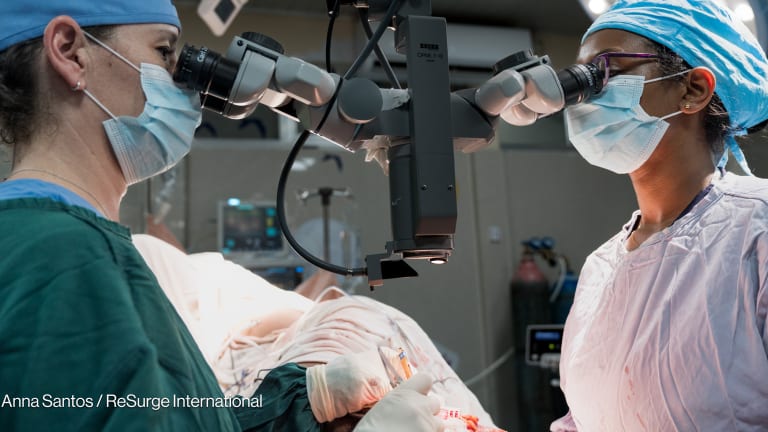
Data is power. In health care, most of that power comes from research, who is studied, and which questions we ask. Globally, the under-representation of specific populations in medical research — particularly those from low- and middle-income countries — is driving inequities in health and holding back progress.
Today, 84% of the world’s population live in LMICs and most of those individuals lack access to safe, affordable, and timely surgical care. We are facing a global shortage of 15 million health care workers by 2030, which represents a shortfall of nearly 143 million surgeries per year. Even nonsurgical interventions, such as the COVID-19 vaccine, a great triumph of modern medicine, have followed the well-trod pattern of deep global inequality, as the African continent is just 16.9% fully vaccinated.
Without an intentional global shift in how we do research and approach health care needs, this inequity will continue to persist and put those in LMICs at a deeper disadvantage.
It is imperative to develop contextually appropriate solutions to ensure everyone has equal access to health. With health infrastructure, technology, and genetic studies based almost entirely in wealthy nations, today’s researchers and clinicians are incentivized to focus on problems and diseases prevalent in high-income areas.
When you have well-represented communities at the table, you make decisions and cultivate ideas that will serve a wider variety of settings, individuals, and realities.
—This means research is focused disproportionately on people with European ancestry. From research and clinical standpoint, the lack of genetic diversity in databases has severe implications in patient care globally, as current genetic advancements are based on such a small subset of the world’s population.
Researchers with Operation Smile have created the largest and most diverse database of genetic samples of patients with cleft conditions and matched controls in LMICs, which is unearthing breakthrough risk factors of disease. The aim is that one day these findings will be used to prevent congenital conditions before they develop in the womb and in children who are at the highest risk of living with the disease.
Yet this is just a green shoot in a health care sector in which innovation and genetic research focus largely on high-income settings. There are more ways we can work to narrow these inequities in research and surgical care around the world.
First, let’s drive research and development to develop fast, affordable, and reliable digital health solutions that are functional in low-resource settings. Telemedicine has saved millions of lives worldwide.
In parts of sub-Saharan Africa where we work, a virtual simulation app, AmoSmile, allows medical practitioners in low-resource settings to learn essential surgical skills. For less than $5, a doctor or a nurse can hone their skills for performing surgery anywhere in the world with just the app and a scalpel. This is one critical solution to closing the global deficit of surgeries that are needed but never performed each year.
Second, we need to expand genetic research to vulnerable populations so that they are part of our understanding of human genetics and not an afterthought while the international academic community develops its baseline knowledge.
This is more complex due to the expensive high-tech machines and resources required, and collaboration is also needed between the public and private sectors as well as the robust support of the philanthropic, academic, tech, and venture sectors.
Third, we need to expand educational opportunities to build the next generation of surgeons, nurses, doctors, researchers, and medical assistants worldwide. With a global shortage of nearly 2.2 million surgeons, anesthetists, and obstetricians, this is a critical step to achieving global health equity. This will require the development of context-appropriate and innovative education methods — we cannot simply use the model and scale of high-income countries.
Lastly, let’s make this the decade that women rise in global health. While women make up 70% of health sector workers, they hold just 25% of senior roles in health institutions. More women in medicine — particularly in positions of leadership — will create prosperity, empower women, and close the surgeon shortage.
This inclusion could launch a revolution in health innovation. When you have well-represented communities at the table, you make decisions and cultivate ideas that will serve a wider variety of settings, individuals, and realities. In Morocco, a local researcher shared with us a potential cause of cleft conditions that is rarely studied but potentially impacts thousands. This is something that is only present in certain regions of the world, and we only know because she had a seat at the table.
Health equity then isn’t just a boon for the communities and nations lacking access. It’s how we expand our understanding of health, genetics, and risks globally — and solve them together.
Digital technology. Medical innovation. Education and opportunities. Understanding those in need through quality and diversity in research. This is the model for a global health system that is equitable, dynamic and, most of all, effective.










